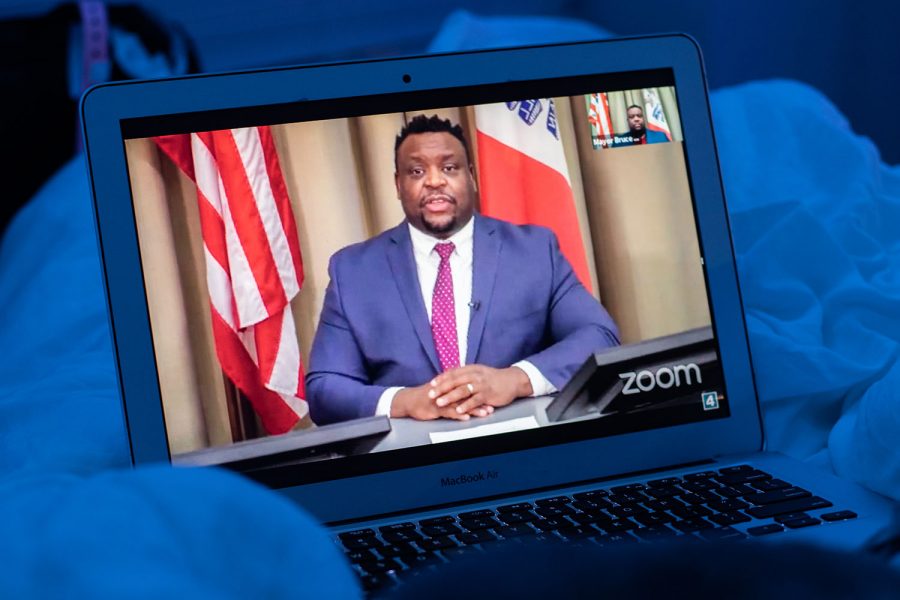Truth and Reconciliation commission to resume after joint meeting with City Council
Three weeks after it was suspended by the City Council, Iowa City’s Ad Hoc Truth and Reconciliation Commission will resume meetings with a new crop of commissioners.
Iowa City’s mayor Bruce Teague holds the online Iowa City City Council Meeting, broadcasted live on Youtube, on Tuesday, February 16, 2021. The meeting covered many topics, ranging from transit updates to police budgeting.
April 13, 2021
The Truth and Reconciliation Commission will resume meetings with a newly composed membership starting on Thursday with a joint meeting with the Iowa City City Council, after the council appointed two new members to the group this week.
On Monday, the council named Sikowis (Christine) Nobiss and Daphney Daniel to the commission. Daniel won’t take up the position until April 23, when Layana Navarre-Jackson’s resignation takes effect. Nobiss is Plains Cree-Saulteaux of the George Gordon First Nation and founder of the Great Plains Action Society.
At its meeting last week, the council named Chastity Dillard, Wangui Gathua, and Clifton Johnson to the commission. David Germann was added but later removed, as he had withdrawn his name from consideration before last week’s meeting.
The new members will join Chair Mohamed Traore, Vice Chair Amel Ali, and commissioners Kevo Rivera and Eric Harris to fill out the nine-member board.
A joint meeting between the council and commission on Thursday will mark the reinstatement of the commission after it was suspended in late March following contentious meetings and a slew of resignations.
Shortly after the commission was created, its meetings became contentious and sometimes disorganized, with members talking over each other and attempting to vote on items not on the agenda. The commission attempted to remove former Chair Royceann Porter from her post in early March, but she resigned the position before the vote was taken.
After three members — union organizer Anthony Currin, Porter, and Vice Chair T’Shailynn Harrington — resigned from the commission, the City Council suspended the commission in March, with a plan to revive the commission after a joint meeting on April 15.
In a joint meeting between the council and the commission on Thursday, the parties will outline the commission’s bylaws and budget, according to an agenda for the meeting. Following that meeting the commission will have its first meeting since the suspension.
After the suspension went into effect, Iowa Freedom Riders organizer Raneem Hamad resigned from the group, saying the council had too much influence over the commission.
Layan Navarre-Jackson submitted her resignation on Friday, citing schedule conflicts, bringing the total number of resignations of initial commission members to five.
The Peoples Truth and Reckoning Commission
At the same time as the council meeting, the Iowa Freedom Riders will host the organizational meeting of the Peoples Truth and Reckoning Commission, which the group announced after the city commission was suspended.
Similar to the city’s Truth and Reconciliation Commission, the goal of the Peoples Truth and Reckoning Commission is truth-telling, investigation, reparations, healing, artistic exploration, and education, according to a March 26 press release. The commission will be independent of city government and won’t have the legal standing of a city-chartered group.
The Iowa Freedom Riders is a protest group that led calls for racial justice last summer, and their demands led to the creation of the Truth and Reconciliation Commission in the city. But the group called the commission a “puppet TRC” in the press release and said the council was limiting its ability to do meaningful work.
The Peoples Truth and Reckoning Commission will be based on Truth and Reconciliation Commissions from around the world, according to the press release, though its exact structure hasn’t been laid out yet.
“The structure and content will be co-created by participants in gatherings and sessions starting on April 15,” the press release said. “The Commission itself will be democratically selected and will likely consist of some participants linked to IFR and some drawn from the broader community of individuals and organizations focused on racial justice.”



